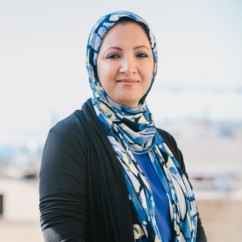Suaad Allami
Fern Holland Award, 2017

Focus Areas
Sadr City covers ten square miles in the northeast corner of Baghdad. It houses close to 2.5 million people and is the base of the Al Sadr militia. It’ s also where lawyer Suaad Allami was born and has chosen to stay. Her perspective has given Suaad insight into an important part of Iraq’ s story, and what it will take for her nation to rebuild. “Poor people need more than awareness. They need services. They need to touch their rights.”
Before the war, Iraqi women freely held positions in every sector, she remembers. Today, the same women are limited and vulnerable, both inside and outside their homes. In times of political unrest, insecurity, and economic hardship, violence against women increases. It’ s no different in Iraq, a country that has endured economic sanctions, 4 wars and continued internal violence. Afraid to speak out, and uncertain of their rights, women believe they have no choice but to endure. Less than three percent of women who suffer violence seek help from the police.
Suaad is convinced that peace and democracy cannot thrive until women’ s freedom – freedom from violence, and freedom of opportunity – is restored.
A lawyer with 20 years’ experience practicing family law, Suaad has served on the Baghdad Provincial council and the Sadr City District Council. She could have left Iraq when war broke out, but she saw a need and chose to respond to it.
Seven years ago in Sadr City, Suaad opened the first legal clinic for women in Iraq, Women for Progress. The clinic provides free representation and informs women about their legal rights and options in cases of divorce, custody, and gender-based violence. Most of the women who visit Suaad’ s clinic are survivors of domestic and sexual violence; she offers them free healthcare and medical services in addition to legal assistance. Though tension is high beyond its walls, all Iraqis are equal in her clinic, there is no room for sectarianism or discrimination.
Suaad also looks for solutions beyond the law, offering education and vocational trainings that make economic opportunity and independence possible. She says that she sees a shift in the women who attend classes. “When women get out of the house to a training or workshop, they sense their own energy, see their value, and become open to change.”
The work is dangerous, and those who disagree with what Suaad is doing have ways of letting her know. Threats, intimidation, and the assassination of women who served alongside her on the Sadr City council are meant to deter Suaad – they haven’ t. Suaad continues to expand her services. She is resolved to do her part to reintegrate women into Iraqi society and to engage their talents and perspectives in reconstructing a better nation.
It’ s her hope that other countries in the region learn from the experience of Iraqi women, preserve women’ s rights and freedom, and involve them as equal partners in transitions to peace.